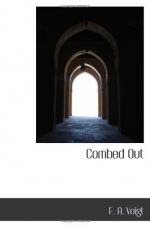At the bottom of the wood-yard was a little stream, and on the far bank clusters of oxlips were in bloom. Here we would lie down during the midday interval and surrender to the charm of the spring weather. It seemed unnatural and almost uncanny that we should be happy, but there were moments when we felt something very much like happiness. Moreover, it was rumoured that leave was going to start. How glorious it would be to spend a sunny May or June in England!
Once a fortnight we paraded for our pay outside one of the bigger sheds of the yard. As a rule, I was filled with impatience and irritation at having to wait in a long queue and move forward step by step, but now it had become pleasant to tarry in the sunshine. One day, when we were lined up between two large huts, a deep Yellow Brimstone butterfly came floating idly past. It gave me inexpressible delight, a delight tempered by sadness and a longing for better times. I drew my pay and saluted perfunctorily, being unable and unwilling to think of anything but the beauty of the sky, the sun, and the wonderful insect.
I held my three ten-franc notes in my hand and thought: “I will enjoy this lovely day to the full. When we get back to camp I will do without the repulsive army fare, I will dine at the St. Martin and buy a bottle of the best French wine, even if it costs me twenty francs. And then I’ll walk to the little wood on the hill-slope and there I’ll lie all the evening and dream or read a book.”
The whistle sounded. It was time to go back to work. But I cursed the work and decided to take the small risk and remain idle for an hour or two. I went to an outlying part of the yard and sat down on a patch of long grass and leant back against a shed. The air was hot and several bees flew by. Their buzzing reminded me of summer holidays spent in southern France before the war. I thought of vineyards and orchards, of skies intensely blue, of scorching sunshine, of the tumultuous chirping of cicadas and grasshoppers, and then of the tepid nights crowded with glittering stars and hushed except for the piping of tree-frogs.
Before the war—before the war—I repeated the words to myself. They conveyed a sense of immeasurable remoteness, of something gone and lost for ever. But I wouldn’t think about it. I would enjoy the present. But the calm waters of happiness had been ruffled and it was beyond my power to restore their tranquillity. I began to think of many things, of the war itself, of the possible offensive, and soon the fretful rebellious discontent, that obsessed all those of us who had not lost their souls, began to reassert itself.




